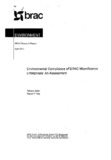| dc.description.abstract | BRAG is concerned about environmental aspects in its development programmes. In
this backdrop, a cross-sectional comparative study was designed to assess
environmental performance in BRAG microfinance enterprises. Total 1200 borrowers
(579 Dabi, 621 Progoti) involved in various incomes generating activities were
randomly selected from 30 sadar upazilas (divisidnal capital of sub-districts). The
analysis was conducted on selected environmental indicators such as use of raw
materials and chemicals, waste management, environmental pollution, knowledge
about key environmental aspects etc. Statistical techniques such as frequency
distribution, chi-square and t-tests were used to 'get proportion of values and to
compare the differences between indicator values. :The findings revealed that above
90% respondents received information from BRAG staff about environmental pollution,
tree plantation, waste management, use of safe water and latrine, keeping hand
washing materials, and so on. Use of alternative fue~ (79%) and raw materials (79.6%)
were relatively less received information from BRAG staff. Compared to the other
types, mainly degradable raw materials were used jn both enterprises, while the use
was higher in Dabi (187.9%) than Progoti (161%). Thus, degradable wastes were
generated higher in Dabi (213.8%) than Progotf (20?8%). Disposal of different types
of wastes at fixed and safe place was found higher in Progoti than Qabi enterprises
(e.g., degradable solid waste: Dabi 55.8%, Progoti 71%; non-degradable waste: Dabi
34.8%, Progoti 45.8%; liquid waste: Dabi 39.6%, Progoti 52.2%). Probability of
environmental pollution was observed less in both Dabi and Progoti enterprises.
Majority of Oabi and Progoti enterprises used chemical materials in their business
activities, but adoption of safety measures was foond very less in both enterprises
implying exposure to health risks. Fixed and safe disposal of wastes and adoption of
safety measures during handling chemical materials are imperative to avoid
environmental pollution and health risks. | en_US |

